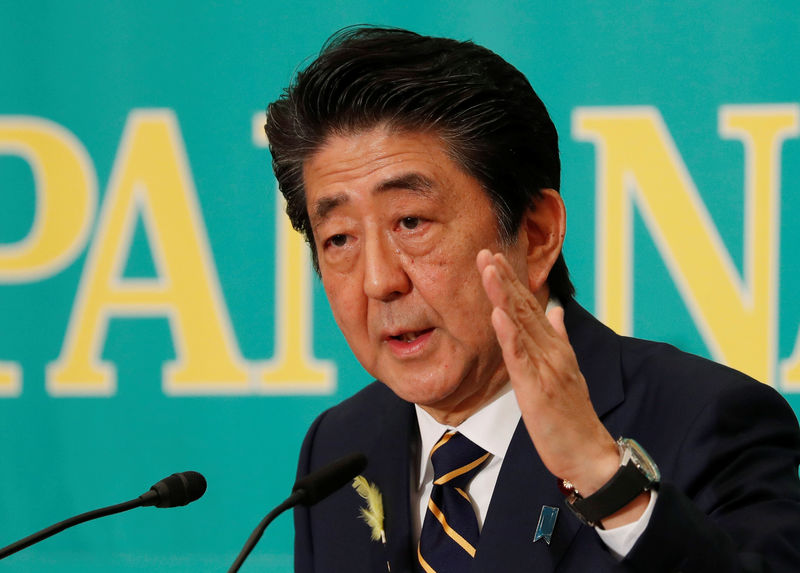By Tetsushi Kajimoto
TOKYO (Reuters) - Japanese companies broadly support Prime Minister Shinzo Abe's tough trade stance against South Korea, a Reuters poll found.
Three-quarters of companies in the monthly Reuters Corporate Survey approved of Abe's explanations for curbing exports to South Korea of materials used to make computer chips.
More than nine in 10 predicted Japan would win if Seoul takes its complaints to the World Trade Organisation (WTO).
The acrimonious trade dispute between the Japan and South Korea, two U.S. allies, grew out of a row over wartime forced labor.
Abe last month tightened curbs on exports to South Korea of three high-tech materials needed to make memory chips and display panels. The government this month canceled South Korea's fast-track trade status.
Removing South Korea from a "white-list" of favored export destinations means some Japanese exporters face more paperwork and on-site inspections before they can win permits, which could slow Korea-bound exports for a wide range of goods.
In the survey, companies were split on whether the trade curbs will affect the Japanese economy. Some companies said they won't be affected as they don't directly engage in business with South Korea.
Those seeing an impact from the export curbs expressed concerns including the global slowdown and spreading trade frictions, worsening Japan-South Korea ties, weaker corporate profits and long-term competitiveness of their firms.
"As we stand on the brink of a recession amid U.S.-China trade frictions, it's undesirable to take such steps that could accelerate the downtrend," a manager at a wholesale firm wrote in a survey response.
Others disagreed.
"It's obvious that the Moon (Jae-in) administration is putting its utmost priority on reconciliation with North Korea at a time when North Korea proceeds with nuclear development," wrote a manger at an electric machinery maker. "It's only natural to deprive South Korea of most-favored-nation status."
In opinion polls last month, the liberal Asahi newspaper found 56% of the public felt Abe's trade moves were "reasonable", while the conservative Yomiuri found 71% supported the measures.
Seoul sees the export curbs as retaliation over a dispute about wartime forced labor, while Tokyo cited unspecified security reasons.
Asked how they evaluate Japanese government's explanation for its export curbs against South Korea, about three-quarters of companies in the Reuters poll said it has been explained fully or to a degree.
The survey, conducted July 31-Aug. 14 for Reuters by Nikkei Research, canvassed 504 midsize and large Japanese manufacturers and non-manufacturers. Managers respond to the survey on condition of anonymity to voice their opinions more freely.
FORCED LABOR DISPUTE
A fresh dispute over wartime forced labor was triggered last year when a South Korean court ordered Japanese firms to compensate some of their former laborers. The dispute brought bilateral ties to their lowest point in decades.
Japan argues the issue was settled by a 1965 treaty normalizing bilateral ties. South Korean President Moon said on Friday that Seoul would be open to dialogue with Tokyo as needed, in a carefully choreographed message at his address marking Korea's independence from Japan's 1910-45 colonial rule.
If South Korea brings its complaints against Japan's export curbs to the WTO, an overwhelming 94% of companies in the Reuters poll said Japan would win.
"Japan's argument stands to reason. No other country including the United States is siding with South Korea," one manager wrote.

"Still, Japan needs to lobby hard to win the backing of other countries," the manager said, given that South Korea in April won the bulk of its appeal in a dispute at the WTO over import bans and testing requirements it imposed on Japanese seafood.